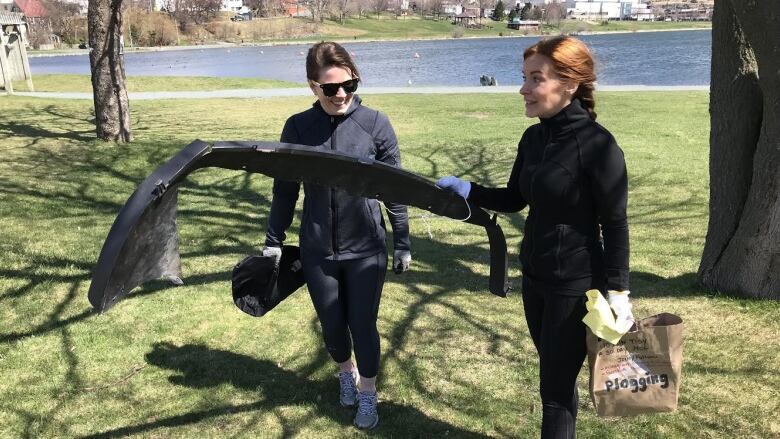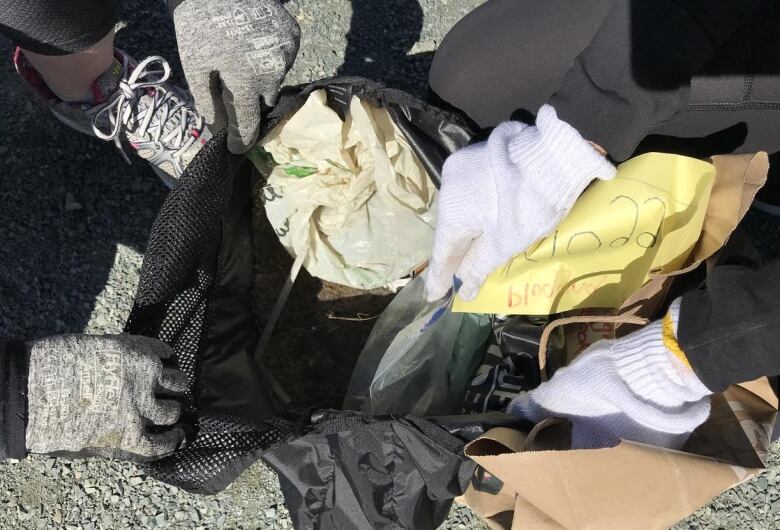Plogging: Swedish trend that combines jogging and litter pickup finds footing in N.L.
It's a way to stay fit and clean up your community, and it's supposed to be wild

The latest trend from Scandinavia has nothing to do with lighting candles or feeling cozy unless you find it relaxing to pick up garbage while exercising.
Plogging, which originated in Sweden, is the act of combining jogging with picking up litter.

And after being inspired by a mutual friend in Vancouver, two St. John's women are trying to make plogging happen in the Newfoundland and Labrador capital.
"It's just a new take on something that people have been doing for a long time," Kiley Best, who started the PloggingNLsocial media accounts with Kim Byrne, told the St. John's Morning Show.
Why go plogging?
Byrne and Best, whoare challenging Newfoundlanders andLabradoriansto goploggingfor at least 10 minutesevery day in May, say there are several reasons to make it a habit.
One benefit is obviously environmental. Newfoundlandisa windy place, Best pointed out, surrounded by ocean. Picking up trash on land keeps it from ending up in the water.
"There's lots of stuff in the ocean that shouldn't be there, so if we can decrease our amount by picking up a few pieces every day then we're doing our part," she said.
There are also benefits to tourism byensuring visitors see a clean and cared-for province, said Byrne, but those benefits extend to locals as well.
"As Newfoundlanders we have a lot of pride," she said of her motivation to take care of her community and the people in it.

"Idon't want your children or your pets stepping on this, so if Isee it, Iown it."
Sometimes that philosophy extends that ownership to less-than-desirable items. As Best and Byrne walked around Quidi Vidi Lake picking up litter recently, a tampon applicator was among the items collected.
"I'm gonna have to use my plastic glove for that one," Byrne said.
Other items collected included several plastic bags, a plastic lid, a coffee cup and for reasons unknown, a chunk of carpet.
- Do a little jog, pick up a little trash, let's go ploggingtonight!
- Plogging: an eco-friendlyfitness mashup of jogging and picking up trash
"This time of year, all those bombs that have been in the snowbank all winter are emerging, so we get the weird stuff sometimes," Best said.
Picking up that smorgasbord of trash involves some safety precautions. She and Byrne use plastic gloves while plogging, and collect trash in a reusable bag. They also avoid picking up sharp objects and encourage others to do the same.
"We try to tell people, 'When you are out here picking up the garbage as you go, be safe first,'" Byrne said.
Keeping fit and having fun
It's easy to work even a few minutes of plogging into your day, Best and Byrne said.
You can spend 10 minutes of your regular run or walk plogging, or do it a few minutes here and there as a dedicated activity, Byrne said.
For serious runners who don't want to interrupt their run, ploggingcan be done during cool down, after the run, or during walking breaks, Best said.
Both agree that the most important thing is to find a way to do it, however you fit it in, because a few pieces of trash picked up here and there add up.
"If Ipick up 10 pieces every day, at the end of the week that's 70 pieces," Byrne said.
"If Newfoundlanders really saw this as a thing and everybody did it, next year we probably wouldn't have that much to clean up."












_(720p).jpg)


 OFFICIAL HD MUSIC VIDEO.jpg)
.jpg)



























































































